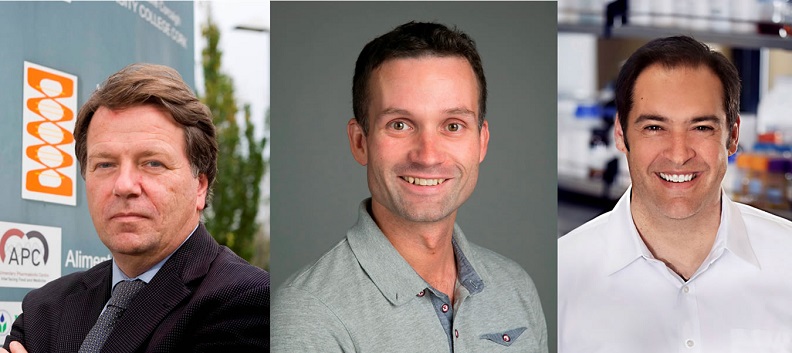2015 Press Releases
APC Microbiome Institute Partners with Second Genome

The APC Microbiome Institute at UCC has entered into an alliance with Second Genome Inc. to develop microbiome-based therapies that prevent and treat inflammatory bowel disease (IBD).
San Fransisco-based Second Genome, Inc. is a leader in the development of novel medicines through innovative microbiome science. Scientists from both groups will partner to explore the role of the microbiome in IBD by analyzing data from patients to identify new opportunities for therapeutic intervention.
The focus of the research will be to identify bacterial species and mechanisms that are driving IBD biology. This alliance between academia and industry allows both groups to benefit from the other’s expertise and facilitate a two-way exchange of ideas. Second Genome has assembled a one-of-a-kind drug discovery platform that integrates microbiome and host biology for the identification of novel targets and drugs, and the APC Microbiome Institute has deep clinical and bacterial culturing expertise.
“Partnering with the APC Microbiome Institute at UCC unites their clinical and microbiome expertise with our ability to effectively translate microbiome science into novel therapies,” said Peter DiLaura, Second Genome’s CEO. “Second Genome has made a commitment to understand the mechanisms that drive IBD disease biology, and this alliance further advances our efforts to improve treatment options for patients.”
The APC is a partnership between UCC and Teagasc, the agriculture and food development authority in Ireland, with more than 170 scientists and clinicians working on the human microbiome. This vast collection of microbes living in and on the human body plays an important role in the health of the human host, and microbiome research is recognized as one of the most important emerging fields in biomedical research. The APC Microbiome Institute, which was formed more than a decade ago, is supported by Science Foundation Ireland (SFI) and by funding from national and global partner companies.
“The APC has had a long history in understanding how the microbiome influences human health, and finding novel ways to treat chronic illnesses such as IBD, “ said Fergus Shanahan, M.D., Director of the APC Microbiome Institute and Professor of Medicine at UCC. “Second Genome is a leader in the development of innovative therapies using microbiome science. This collaboration will allow our teams to collaborate to bring new treatment approaches for patients suffering from Crohn’s disease and ulcerative colitis.”
Ends
About Second Genome
Second Genome’s mission is to transform lives with medicines developed through innovative microbiome science. Second Genome has built a novel platform for microbiome drug discovery, and is engaged in active programs in multiple areas of significant unmet medical need. Please visit www.secondgenome.com for more information.
About APC
The APC Microbiome Institute (http://apc.ucc.ie) is the Irish research institute for diet, medicine and the microbiome, funded by Science Foundation Ireland and industry partners. The APC, a partnership between University College Cork, the Irish Agriculture and Food Development Authority (Teagasc), and the Cork Institute of Technology, carries out research on the gastrointestinal bacterial community (the microbiome). The microbiome is not only a target for treatment and prevention of disease, it is a repository for functional food ingredients, new drugs and biomarkers of disease. Over the past decade APC scientists have related food and microbial diversity with health, have discovered new anti-microbials and anti-inflammatories and developed templates for future foods. Pharmabiotic is a neologism devised by the APC to represent any material (including molecules and microbes) originating from the gut ecosystem that can be exploited for a health benefit, and includes probiotics, prebiotics, metabolites, and potential new anti-microbials and anti-inflammatories.
